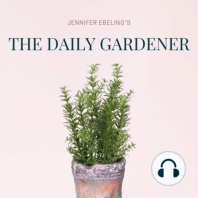8 min listen

March 31, 2020 Starting Seeds, Renee's Garden Seeds, John Lineback, William Ralph Meredith, Elmer Ivan Applegate, Muriel Wheldale Onslow, April Poems…
March 31, 2020 Starting Seeds, Renee's Garden Seeds, John Lineback, William Ralph Meredith, Elmer Ivan Applegate, Muriel Wheldale Onslow, April Poems…
ratings:
Length:
35 minutes
Released:
Mar 31, 2020
Format:
Podcast episode
Description
Today we celebrate the man who invented the cottonseed huller. We'll learn about a Canadian legal eagle who loved gardening and one of Oregon's pioneer botanists. We'll celebrate the work of a female biochemist who made some remarkable discoveries about bloom color by studying snapdragons. Today's Unearthed Words feature words about March. We Grow That Garden Library™ with a book that was released 11 years ago today. And then we'll wrap things up with the fascinating story of a garden activist who was teaching gardening on this day in NYC two years ago. But first, let's catch up on some Greetings from Gardeners around the world and today's curated news. Subscribe Apple | Google | Spotify | Stitcher | iHeart Gardener Greetings To participate in the Gardener Greetings segment, send your garden pics, stories, birthday wishes and so forth to Jennifer@theDailyGardener.org And, to listen to the show while you're at home, just ask Alexa or Google to play The Daily Gardener Podcast. It's that easy. Curated News Starting Seeds: Use What You Have - Lewis Ginter Botanical Garden | Jonah Holland "If you have seeds that are less than three years old, at least some of them should be viable. You could also use avocado seeds, citrus seeds, seeds from dates. You could try anything you happen to have — peppers, squash, beans, or maybe even pineapple! Mail ordering seeds is another option. We asked our horticulturist some of their favorite seed sources, and here are a few of our favorites: Johnny's Select Seeds, White Flower Farm, Peace Tree Farm and Prairie Moon Nursery. You might even have a really fun time exploring the Seed Saver Exchange." My COVID-19 Renee's Garden Seed Order for the Cabin I share the seeds I ordered after planning to ride out the first wave of the COVID-19 pandemic at the cabin. Alright, that's it for today's gardening news. Now, if you'd like to check out my curated news articles and blog posts for yourself, you're in luck, because I share all of it with the Listener Community in the Free Facebook Group - The Daily Gardener Community. There's no need to take notes or search for links - the next time you're on Facebook, search for Daily Gardener Community and request to join. I'd love to meet you in the group. Important Events 1814 Today the inventor and agricultural pioneer John Lineback received a patent for the first cottonseed hulling machine. He was based in Salem, North Carolina. Today, cottonseed hullers are known as disc hullers, and they not only dehull oilseed shells like cottonseed and peanuts, but they also crush oilseeds such as soybeans. Cotton is neither a fruit or a vegetable. The fibers of the cotton plant are made of cellulose. The seed of the cotton plant attaches to the fibers after emerging from the fruit. After maturing and left to its own devices, the cotton plant seed would simply blow off the plant in the wind - which is how the plant would get distributed. Cotton seeds are exactly what you might deduce: the seeds of the cotton plant. They are egg-shaped and are 3.5-10 mm long. The Latin name for the Cotton Plant is Gossypium ("Gah-SIP-EE-UM), and the seeds are richly covered with white or rusty-colored, long, woolly hairs, called lint. It is actually the lint on the outer part of the seed that is the main product used to make cotton textiles. Lineback's machine dehulled the seeds. The hulls are the outer coverings of cotton seeds. Dehulling makes it possible to extract cottonseed oil from the seeds. The process of dehulling is pretty straight forward: after removing the lint, the hull is removed from the kernel by screening. Cottonseed hulls are fibrous, and they also get used and incorporated into food for livestock like cattle and sheep. There's one final note about whole cottonseed worth mentioning: Cottonseed is toxic to humans and most animals. 1840 Today is the birthday of William Ralph Meredith. Meredith was a Chief Justice in Ontario, and he's remembered as the founding f
Released:
Mar 31, 2020
Format:
Podcast episode
Titles in the series (100)
The Daily Gardener Podcast Trailer: The show will start Monday, April 1st. The show is called The Daily Gardener. The Daily Gardener is a weekday show (M-F) - weekends are for rest, family, fun, & gardening! Shows are between 5 - 10 minutes in length. The format for the... by The Daily Gardener